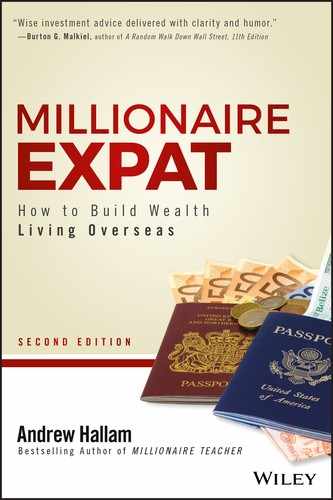Foreword
I was shocked recently to realize that I've been reading personal finance books for 40 years and writing about the topic for 30. (Yes, I started when I was just months out of the crib, thank you.) Over the decades, I've perused hundreds of popular words in the field and I've developed a three‐point checklist to quickly determine whether any author is worthy of attention. The key questions are these: Is he or she impartial and noncommercial? Does he or she base their recommendations on sound academic evidence? And—just as important—can this person make me laugh?
Andrew Hallam is one of the few people to earn full marks on this three‐point checklist. He's not trying to sell me anything. He knows his research. And he's not only funny but enormously likeable.
Now that last quality may strike you as a bit superficial, but I would argue it's not. As much as I admire many of the leading academic writers in this area, and as eagerly as I read their thoughts, I would not want to go on a long camping trip with any of them. They're fine friends to have if you're trying to debate a point or test a hypothesis, but they're not the folks who are going to inspire you to change your life, get your spending in order, or do any of the other chores necessary to build your wealth.
The unavoidable reality of personal finance is that it's personal. What I've always enjoyed about Andrew's writing is that it springs from his life. When he tells you about stock markets or investing strategies, he's telling you about areas he's experienced himself—and not as an academic, or as a highly paid fund manager, but as an ordinary working stiff. His background gives him an unusual ability to sympathize with you, me, and other regular people. Most of us would like to become millionaires on middle‐class salaries. Andrew has done exactly that. As a result, he can offer an unusually personal take on what works and what doesn't.
This book in particular fills an important need. More and more of the world's best and brightest folks are now working abroad. They operate in a world that is liberating but also risky. Expats typically make more money and pay less tax than many of their peers back home. But, as a consequence, they're ripped away from the dependable anchor of state pensions and social safety nets. If they want to replace those familiar stand‐bys in their new homes, they have to navigate a sea of odd companies with unfamiliar names, all of them peddling indecipherable financial products with murky guarantees.
Andrew has been there. A Canadian with British roots, he spent years teaching high school in Singapore. So he's heard the same sales pitches you have. The difference is that he knows how much of those pitches is pure, unadulterated bunk. (Pro tip: If you're in any doubt, set your personal bunk‐o‐meter to “a lot” and move the dial up from there.)
To be sure, there are many consumer advocates. What separates Andrew, to my mind, is that he's also unusually skilled at communicating what he knows. I attribute this to his years in the classroom.
A personal note: Several years ago, Andrew convinced his high school to fly me over to teach a week of classes on writing. Until that time, I had always assumed I fell into the category of Somewhat Interesting Person. Sadly, there is nothing like addressing a morning class of 15‐year‐olds to reveal your personal excitement quotient. After a day or two of attempting to teach teenagers, I was horrified to discover I was human Ambien. The nodding heads of my students told me I was doing everything wrong.
Andrew was kind enough to offer tips about breaking lessons into easily mastered chunks, providing frequent but not obvious repetition, and using humor to communicate serious points. I see those same techniques at work in this book. So if you've always found personal finance to be a snooze, think again. Andrew has the knack of making the subject both easy and fun.
He's also, in a quiet way, inspirational—the great missing quality in much personal finance writing. Anybody can hector us to spend less and invest more. What is difficult is explaining that bringing your money situation under control isn't torture and can even be fun. What many books fail to communicate is that the great payoff from becoming master of your financial domain is that it allows you to go further, do more, and live better.
Andrew certainly does all those things. For years now, I've lived vicariously through his adventures. Whether he's biking through Vietnam, swimming on a Thai beach, driving an RV to Mexico, or doing something equally outlandish, he boldly goes where few us of us have gone before. Along the way, he somehow manages to be both budget conscious and funny. Many investors, for instance, idolize billionaire Warren Buffett and even fly thousands of kilometers to attend his annual get‐together in Omaha, Nebraska. To the best of my knowledge, though, Andrew is the only attendee to ever write the great man and ask if he could sleep on his couch. (True story. It got written up in the Wall Street Journal.)
If your own journey into personal finance is just beginning, I highly recommend Andrew as the ideal traveling companion. He will make sure you see all the essential sights while painlessly communicating great reams of useful knowledge. And, yes, oh yes, he will make you laugh.
—Ian McGugan, The Globe and Mail
